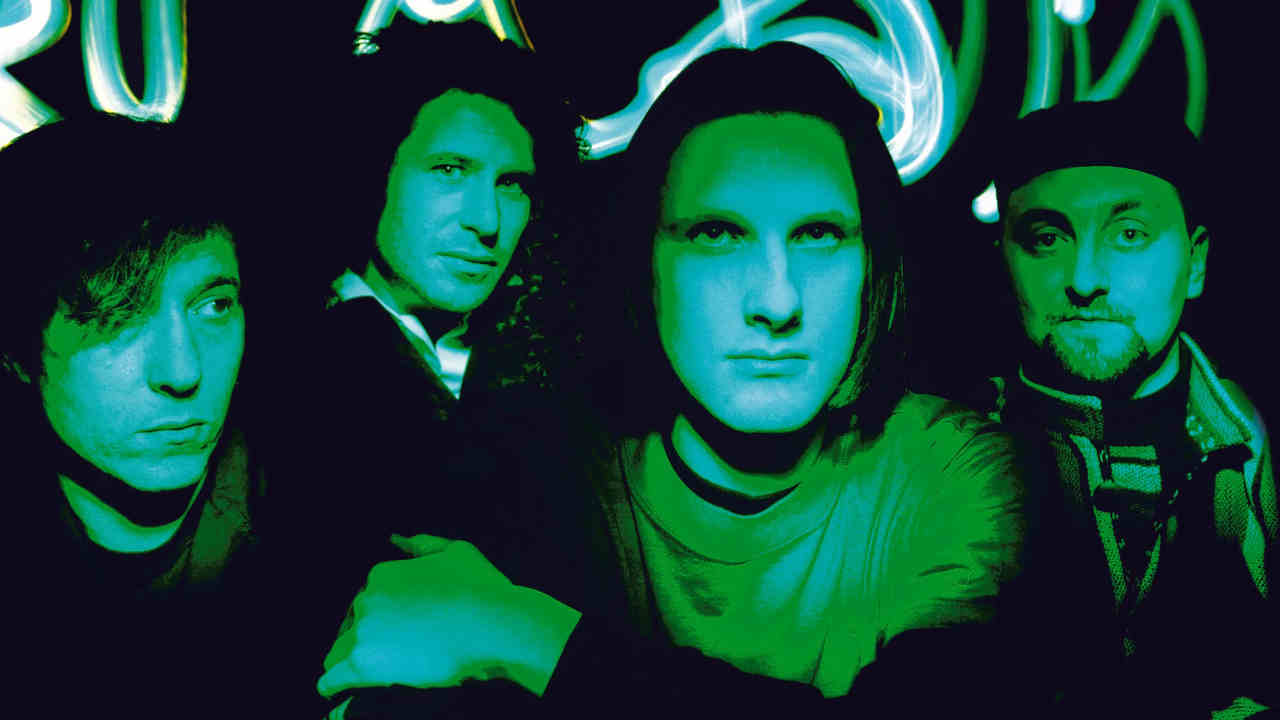
Porcupine Tree spent much of the 1990s as standardbearers for the underground British prog scene. But by 1999’s Stupid Dream, they were ready to step up to the big time. In 2018, mainman Steven Wilson looked back on the album prepared prog for the 21st century.
It’s quite interesting to cast one’s mind back to 1999 when Porcupine Tree released Stupid Dream and to draw comparisons to the furore that surrounded the release of Steven Wilson’s most recent album, To The Bone, in 2017. When early reports filtered out onto the web that with To The Bone Wilson was making a sonic shift, all manner of toys were hurled out of the prams of the prog diehards and Wilson devotees, and the tumult hasn’t stopped since. “It’s a pop record” was the oft-heard cry from detractors as Wilson pointed his compass in the direction of the 80s. Not the brash, garish, shoulder-padded 80s pop of Duran Duran or Frankie Goes To Hollywood, but the more progressively minded intelligent rock and pop that had emanated from artists such as Peter Gabriel, Kate Bush, Talk Talk and Tears For Fears. These are all artists who currently find much favour with the progressive community, but that didn’t stop barbs being sent in Wilson’s direction. And it continues to this day.
For all the assumed musical superiority over other genres, prog fans, like most rock fans, are afraid of change. It’s strange for a genre called ‘progressive’, that supposedly prides itself on pushing boundaries as it constantly evolves, that the default setting for anything new or slightly different is ‘panic’. Equally, Wilson’s ubiquity is often cited by those who wish to diminish his achievements, yet this is another very common trait for a musician in the progressive world. The very fact that To The Bone reached No.3 in the UK album chart on the week of its release (it had even duelled briefly with Ed Sheeran and Elvis Presley for the coveted top spot) was looked upon sniffily by some of the prognoscenti. Almost “How dare this new prog man-child be so successful when my beloved Fruupp battled so gamely in the early 70s for nothing?” One imagines Wilson feeling he’s damned if he does, damned if he doesn’t. Although the huge success he’s attained since he dreamed up the idea of Porcupine Tree in 1987 probably makes things bearable for him.
“I don’t think I ever said I didn’t want to be popular or successful,” Wilson muses. “Obviously I’m best known for making music in an area where there hasn’t been a huge amount of commercial success in recent years. But I’m just like every other musician you’d meet: I have an ego, I want to be accepted and liked, and I want my music to be as popular and successful as can be. Who wouldn’t want that?”

When Porcupine Tree released Stupid Dream in 1999, Wilson was nowhere near as successful or well known, or as ubiquitous, as he is today. In fact only his post-rock group No-Man, which he formed with Tim Bowness back in 1987, presented any kind of challenge to the Porcupine Tree mothership. And yet Stupid Dream, the fifth studio album from Porcupine Tree, marked a distinct shift in sound and approach. Perhaps even more so than Wilson’s To The Bone did after its predecessor Hand.Cannot.Erase.
“The sound of the band before we made Stupid Dream was quite different to how we sounded when we started,” Wilson points out. “The early stuff is really quite psychedelic in a way. If you listen to something like Voyage 34, it might be a lengthy piece of music but it’s got ambient and dance influences in there. It was only after Up The Downstair (1993) that things sort of shifted in a more progressive direction.”

Porcupine Tree had actually begun as a band name Wilson dreamed up for the booklet for his first demo tape, Tarquin’s Seaweed Farm, but by the time the band’s first official album, On The Sunday Of Life, was released in 1992 the name had stuck. Up The Downstair saw the first appearances from former Japan keyboard player Richard Barbieri and bassist Colin Edwin, and drummer Chris Maitland featured on 1995’s The Sky Moves Sideways. When Porcupine Tree entered the studio to record 1996’s Signify, it was the first time Wilson had a proper band around him, and it was one that would remain intact until Gavin Harrison replaced Maitland in 2002, the band’s sole line-up change until went on a decade-long hiatus in 2011.
“It certainly helped give us more of a sense of band identity,” Wilson says today. “Up until then it had really been me, with musicians coming in to help out as and when I needed them. The band were in place for the tour for The Sky Moves Sideways, but Signify was the first band album in that sense. So by the time we got to Stupid Dream, things were reasonably settled.”
Released in March 1999, Stupid Dream was the first Porcupine Tree album to shift away from the long-form musical pieces that made up the bulk of previous recordings and concentrate on a shorter, more focused style. In much the same way that Hand.Cannot.Erase. pointed to the direction that To The Bone would take, so Signify edged Porcupine Tree in the direction of Stupid Dream. True, the sound of Signify is still of a swirling, Floydian soundscape, but the song lengths were getting shorter. Where The Sky Moves Sideways was largely built around the epic two-part title track and the equally lengthy Moonloop (itself an edited version of an earlier 40-minute band improvisation), on its follow-up the song lengths were definitely more concise.
By the end of the decade, progressive music had largely woken from it lengthy 90s malaise. American prog metal pioneers Dream Theater had helped point the way, and although things were still some way off from the resurgence of a decade later, Porcupine Tree were frequently being hailed as both movers and saviours for the genre in the UK music press. But that was something that did not always sit well with the band’s main protagonist.
“We were often being called the ‘Pink Floyd of the nineties’. And while there was a bit of truth to that, to me there’s always been more in my music,” Wilson explains.
This writer remembers that the Wilson of the time could get quite animated in interviews, rejecting the ‘prog rock’ tag.
“I’m not going to deny that progressive music isn’t part of my make up,” he sighs. “Everyone knows that Dark Side Of The Moon was a very early influence on me. But then so was Donna Summer. And I’ve always seen my music as both reflecting all my influences, which are many and varied, and always moving forward. It would be difficult to say that any two of my records sound the same.”
While Stupid Dream isn’t a drastic sonic departure from what Porcupine Tree had released before it – it has strong echoes of the band’s more modern take on progressive rock, for example – only opening track Even Less (at just over seven minutes) and Don’t Hate Me (eight and a half) represent the kind of thing that prog fans, who will often look to a song’s length rather than what’s contained therein, revel in. The bulk of the material comes in at the three-to-four-minute mark. And although Wilson was no stranger to shorter material, Stupid Dream represented his songwriting at his most concentrated.
“I was much more interested in songcraft at that point,” he says. “There’d been plenty of long-form composition in what we’d done previously. But at the time of writing Stupid Dream I was listening to things like Todd Rundgren, Brian Wilson’s stuff with the Beach Boys, Jeff Buckley, Crosby, Stills, Nash And Young. Just exploring a different part of my creativity. But I don’t see a drastic shift in the actual sound of the band on Stupid Dream.”
One thing that had changed was the band’s record label. Delerium, run by the band’s manager until 2004, Richard Allen, had released all the Porcupine Tree albums to that point. For Stupid Dream the band signed to Snapper, who released the album on their modern prog Kscope imprint (the same label as Wilson’s solo albums prior to To The Bone).
“Richard was great and Delerium had done really well for us,” says Wilson. “But I think there was a feeling, from them as well, that we needed to take another step up, and they weren’t equipped for that.”
Although the band signed to a bigger label, the subject matter for Stupid Dream almost flies in the face of such a move, being Wilson’s take on the music industry at that point: that the aspirations of young musicians in their quest for fame and fortune are nothing but a ‘stupid dream’, given the eternal struggle to achieve such a goal. Which of course has become even more difficult in the years since.
“I think a lot of teenage kids have this dream of being pop stars, of being a professional musician,” is how Wilson framed it at the time. “This stupid dream of being famous and ‘life is a ball and everything is wonderful’. And, of course, actually the reality is that being a professional musician is a very hard work. It can be very heartbreaking, there’s a lot of disappointment, there’s a lot of hard work, there’s a lot of travelling.”

This was reflected in the album cover art, depicting an overly shiny CD pressing plant, workers clad in protective boiler suits, like scientists in some contagious disease lab.
“I remember sitting down with the record company to discuss how we’re gonna market this album,” he says, smiling at the recollection. “And at that point your record becomes a product. I just had this image of these CDs just coming off this conveyor belt. And obviously it’s at complete odds with the music.”
While most reviewers were effusive in their praise of Stupid Dream, some drawing comparisons to Radiohead’s OK Computer from two years earlier (“Of course I’d heard it,” Wilson says), one wrote: “People who love The Tree for their long, experimental and instrumental compositions might be put off by this new album.”
“I don’t recall any real backlash,” he muses. “Or if there was one it didn’t really affect us in any way.”
What Stupid Dream did do was place Porcupine Tree, and by proxy progressive music, in a modern context, from which both have thrived. Wilson would lead Porcupine Tree into a heavier realm after the band signed with US label Lava and later Roadrunner Records, with albums such as Deadwing (2005) and Fear Of A Blank Planet (2007), before placing the band on indefinite hiatus in 2010.
“Working with Mikael Åkerfeldt and Opeth a few years later opened me up to the heavier style of music that Porcupine Tree began to make later,” he admits,”But this, and Lightbulb Sun [2000] were definitely another shift in what we did.”
Interestingly, even Wilson became more comfortable with the ‘prog’ tag as the genre began to evolve with a much clearer and modern approach, away from the old 70s archetypes, and bands such as the aforementioned Opeth, Anathema, the Pineapple Thief and legions more across the globe took up the challenge of continuing its legacy. And now, with his solo career in full swing, Wilson continues to lead the charge.
“Stupid Dream was definitely a pivotal album, both for me and the band. It was a step on in musical terms, continually adapting our sound, and it was step up in business terms, because we really started to get noticed. The next album charted for us, our first, and from then on, every album I’ve ever released, either in Porcupine Tree or solo, has charted higher and sold more than the one before, something I’m very proud of.”
Originally published in Classic Rock 247







